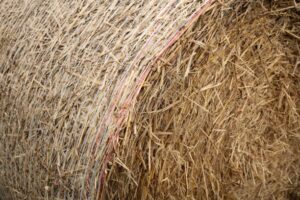In the right hand, knotless baling twine can mend fences, reattach tractor parts and tie a bale of hay. But it’s also essential to know the basics to keep your baling system running smoothly.
The twine disc, or twine holder, holds the twine while the small square or sizeable round baler builds the bale. For more information about the knotless baling twine, click here.
Sisal Baler Twine
 Sisal twine is made of long, natural agave fibres and treated to guard against mildew, rodents, and rot. This durable twine offers excellent tensile strength and works flawlessly in square baler machinery. The knotless construction makes it easy to work with while also being a good choice for use with metal ties.
Sisal twine is made of long, natural agave fibres and treated to guard against mildew, rodents, and rot. This durable twine offers excellent tensile strength and works flawlessly in square baler machinery. The knotless construction makes it easy to work with while also being a good choice for use with metal ties.
While there are many advantages to using sisal twine, it is essential to remember that it can be more expensive than poly twine. Additionally, if the proper knots are not used when baling, it can result in premature moisture loss and damage to the wrap.
Coastal recommends that producers consider knot and tensile strength when choosing twine for their baling needs. Selecting a cord with guaranteed feet per carton and high press density is essential to maximise cost-per-bale results. In addition, producers should choose a twine produced in the US for quality and safety considerations.
Polypropylene Baler Twine
Polypropylene baler twine is a non-biodegradable twine that is perfect for baling hay. It is durable and does not absorb moisture, which reduces the likelihood of breakage. It also doesn’t have the same odour as natural twine, making it safe for your plants and workers. It is also UV-treated, which makes it resistant to degradation caused by sunlight. For more information about the knotless baling twine, click here.
In addition to its strength and durability, this twine is easy to use. Its smooth texture prevents the knot from slipping. It can be used in both round and square balers. It is available in a high-visibility orange, making it easy to see in the field. Its 130 lb. tensile strength makes it durable enough to hold up to heavy, pressurised bales.
When selecting a twine for your baler, ensure it is the right size and weight to ensure it works well with your baler. Checking the guaranteed number of feet per carton is essential, which will help you avoid wasting money by loading a carton more than needed. Coastal, your Northwest-owned and operated phs Wastekit partner, carries many types of twine from brands like BridonMAX. This round, slit-film 110-weight twine comes in a 40,000’ 40,000-foot carton and is guaranteed to work with your machine.
CWC Synthetic Small Baler Twine
Tough polypropylene twine is designed for smaller bales with additional bulk for improved performance and handling. It is available in a variety of colours and features high UV inhibitors.
When choosing a baler twine, you should consider many factors. The right one will ensure you get the most out of your baling machine and maximise the potential of your crops. It should have the correct weight and dimensions to load it quickly. It should also have adequate resistance and elongation at breakage, ensuring your baling machine can handle the pressure applied. It should also have good stability and be compatible with the type of crop or materials to be pressed. For more information about the knotless baling twine, click here.
Some of the most popular baling twines are made by Reyenvas, which has developed a line to meet the specific needs of modern farmers. These include the Max2Twine, PowerPress and Black Label twine, made of recycled post-industrial material.
A YouTuber, One Lonely Farmer, recently did a video test of these twines and found that they performed very well in his baling machines. He didn’t experience any mechanical problems with the machinery or the twine. He was able to make 192 bales with these twines without any issues at all.
Twine is an essential farm tool. It can mend fences, reattach tractor parts and tie bales of hay. This polypropylene or sisal twine has multiple weights and colours depending on the job. The most common reason for missed ties in the knotter on large square balers is the twine disc or holder failing to hold the twine. This problem can be corrected by checking the holder tension.